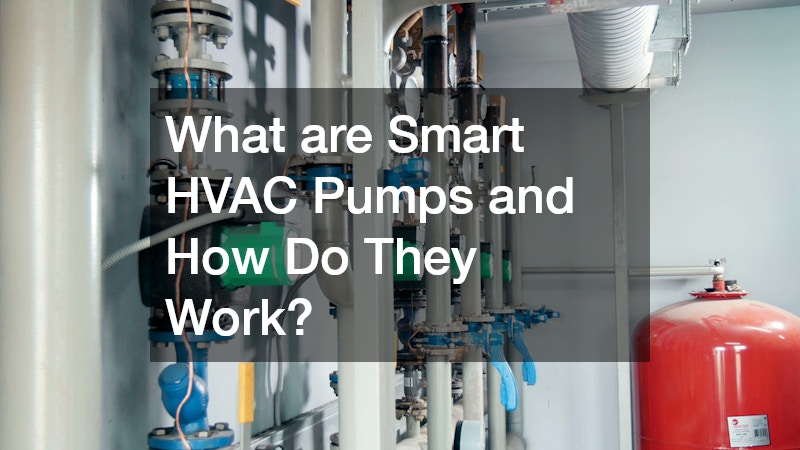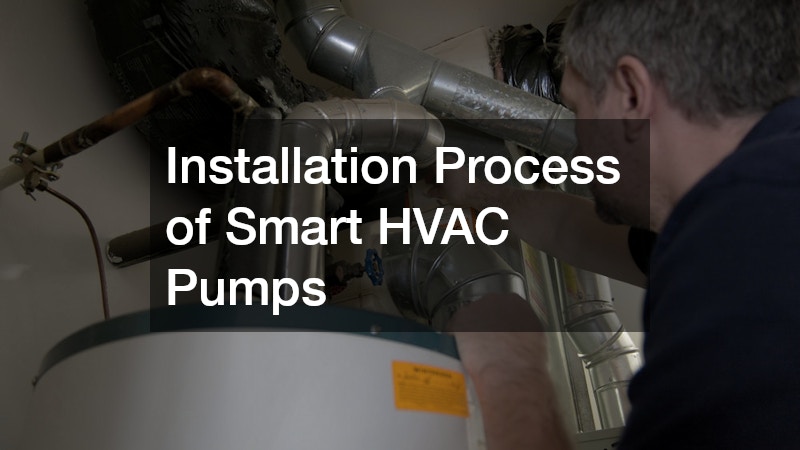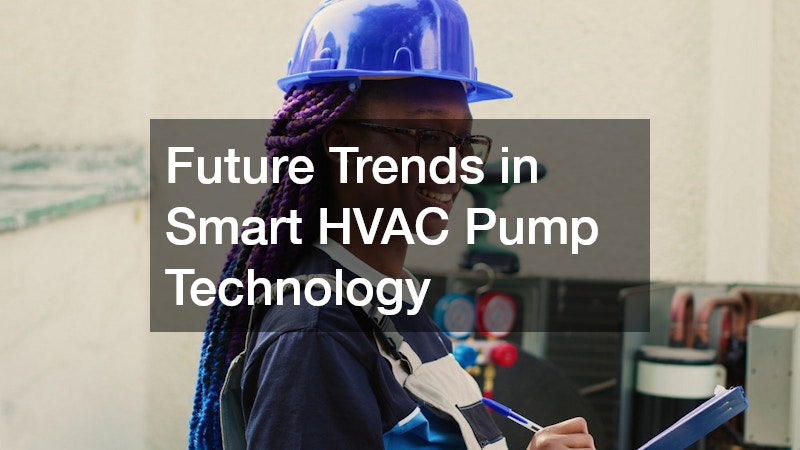In today’s fast-paced world of smart home technology, the integration of intelligent systems has revolutionised how homeowners manage comfort and energy use. Among these innovations, smart HVAC pumps have emerged as a pivotal solution for upgrading climate control. Whether you’re embarking on a major renovation or simply enhancing your home’s heating and cooling system, smart HVAC pumps offer exceptional efficiency, automation, and adaptability. These systems go far beyond traditional models by leveraging advanced controls and intelligent automation that respond in real-time to changing indoor and outdoor conditions.
This article explores the transformative impact of smart HVAC pumps, providing a comprehensive overview of their functionality, cost benefits, installation process, and long-term value. You’ll discover how they integrate seamlessly with other smart technologies and support sustainable living goals by reducing energy consumption and improving indoor air quality. Additionally, we will touch on related home services such as water well drilling services, painters, moving companies, fence builder options, and local roofers, highlighting the broader context of a full-scale home improvement project. From understanding how smart HVAC pumps differ from traditional systems to exploring their role in future home innovations, this guide will equip you with everything needed to make an informed decision.

What are Smart HVAC Pumps and How Do They Work?
Smart HVAC pumps are the next generation in heating, ventilation, and air conditioning systems. Unlike their conventional counterparts, these pumps are equipped with intelligent sensors, digital controllers, and Wi-Fi capabilities, allowing for enhanced control and automation. At their core, smart HVAC pumps function by regulating temperature through the precise management of refrigerant flow and motor speed. This helps in maintaining desired comfort levels efficiently.
The components typically include a variable-speed compressor, smart thermostat, integrated sensors, and connectivity modules. These parts work together to monitor and adjust the system in real time. For instance, the smart thermostat collects data about indoor conditions, while external sensors measure outdoor temperature, humidity, and even sunlight intensity. The system processes this information to automatically adjust the pump’s performance.
Smart HVAC pumps differ significantly from traditional HVAC systems. Traditional pumps operate on a fixed speed, meaning they either run at full power or not at all. In contrast, smart pumps can modulate their output based on actual demand. This results in less wear and tear, improved efficiency, and quieter operation. The integration of smart technology enables remote access through mobile apps, voice assistants, and home automation platforms. For those considering upgrades during larger projects like fence installations or water well drilling services, smart HVAC pumps can be a natural complement to a modernised home.
Benefits of Upgrading to Smart HVAC Pumps
The benefits of smart HVAC pumps are vast, starting with unmatched energy efficiency. These systems consume significantly less energy than traditional models thanks to their variable-speed technology and automated control features. For homeowners seeking to lower their carbon footprint, this upgrade offers a clear path toward more sustainable living.
Cost savings are another key advantage. Though smart HVAC pumps may require a higher initial investment, their ability to operate more efficiently translates into reduced monthly utility bills. Additionally, many governments and local utilities offer rebates and incentives that further offset the cost. These savings can be particularly impactful when bundled with other home services such as HVAC services or heating and cooling repair.
Smart HVAC pumps also contribute to improved indoor air quality. Their precise control over airflow and humidity reduces allergens and airborne pollutants, creating a healthier living environment. This is especially important for families with respiratory concerns or pets. Moreover, these pumps ensure enhanced home comfort by maintaining consistent indoor temperatures and quickly adjusting to any environmental changes.
Environmentally conscious homeowners will appreciate the eco-friendly impact. These systems reduce greenhouse gas emissions and often qualify for green building certifications. If your home improvement includes painters, fencing service providers, or local roofers, incorporating smart HVAC pumps adds even more value by elevating your home’s overall environmental performance.
How Do Smart HVAC Pumps Save Energy?
Smart HVAC pumps are designed to optimise energy use at every turn. The key lies in their variable-speed technology, which allows the pump to adjust its operation according to the specific needs of the home at any given time. Rather than cycling on and off like traditional units, smart pumps modulate their output, reducing energy waste and enhancing efficiency.
Another major contributor is remote climate management. Homeowners can control their systems from anywhere using mobile apps or voice commands, making it easy to turn off the system when the house is unoccupied. Automated system scheduling enables the pump to adjust settings based on occupancy patterns, ensuring that energy is only used when necessary. For example, during summer months, the system can be programmed to increase cooling just before you arrive home, enhancing comfort without running all day.
Real-time monitoring and adjustments allow the system to react immediately to changes in indoor or outdoor conditions. This responsiveness ensures optimal performance with minimal energy usage. Data-driven optimisation is also vital; the system learns from user behaviour and environmental data to improve future performance automatically.
Whether you’re coordinating with moving companies, updating fencing service areas, or scheduling painters for interior upgrades, energy savings from smart HVAC pumps can free up budget for these parallel improvements.

Compatibility of Smart HVAC Pumps with Existing Systems
Integrating smart HVAC pumps with existing systems is possible but requires careful consideration. Many older HVAC systems may not be directly compatible with newer smart technologies. Integration considerations include the age of your current infrastructure, wiring capabilities, and existing thermostats.
Common compatibility issues include outdated wiring, incompatible control boards, and a lack of space for new components. However, these challenges can be overcome with appropriate planning. In some cases, homeowners may need to upgrade additional components such as thermostats, air handlers, or ductwork.
Solutions for non-compatible systems often involve hybrid setups. For instance, integrating a smart pump with an existing traditional furnace can allow for partial upgrades while spreading out the cost. Working with professional installers who are well-versed in HVAC services and heating and cooling repair ensures the best outcome.
Professional installers will assess your current system and provide tailored solutions. Their expertise also ensures the integration meets safety and efficiency standards. When collaborating with other contractors, such as fence builders or local roofers, it’s crucial to coordinate timelines to avoid disruptions and maximise efficiency.
Cost Considerations of Smart HVAC Pump Installations
Cost is often the biggest consideration when deciding to upgrade to smart HVAC pumps. Upfront installation costs can range significantly depending on system complexity, size of the home, and the region. On average, smart HVAC pump installation may cost more than traditional systems due to the added technology and expertise required.
However, long-term financial benefits usually outweigh the initial investment. These pumps drastically reduce energy bills through optimised operation, with some homeowners reporting up to 40% savings. Moreover, utility companies and government programs frequently offer rebates and incentives for installing energy-efficient systems.
When investing in smart HVAC pumps, quality matters. While cheaper models may be appealing, they often lack critical features such as diagnostic tools and energy-saving capabilities. Investing in premium models from reputable brands ensures durability and better performance. Understanding your expected return on investment (ROI) involves considering not only monthly savings but also increased home value and reduced repair costs.
In addition to HVAC upgrades, it may be beneficial to align your budgeting with other services like water well drilling services or moving companies if planning a major relocation or property overhaul. These synergistic projects can share logistics and reduce overall costs.
Key Features to Look for in Smart HVAC Pumps
When selecting a smart HVAC pump, certain features are essential for maximum benefit. Advanced control interfaces such as touchscreen thermostats and mobile app integration provide intuitive system management. These interfaces often include real-time alerts, usage reports, and remote diagnostics.
Energy Star certification is a must, as it indicates the unit meets strict efficiency guidelines set by environmental agencies. Wireless connectivity is another vital feature. It allows for seamless communication between components and compatibility with other smart home devices.
Diagnostic and reporting tools offer invaluable insights into system health and performance. These tools can alert homeowners to potential issues before they become major problems, enabling prompt maintenance or repairs. Noise reduction features are also highly desirable. High-quality smart HVAC pumps operate quietly, enhancing indoor comfort without disruptive noise.
When coordinating with other home improvements such as hiring painters, fencing service providers, or equipment suppliers, knowing the key features of your HVAC system helps you make informed decisions. These features not only improve comfort but also contribute to overall home efficiency.

Installation Process of Smart HVAC Pumps
Installing smart HVAC pumps requires professional expertise and proper planning. Preparing your home involves evaluating the current system, ensuring electrical compatibility, and clearing access to installation areas. This preparation may also involve coordinating with other home service providers, such as local roofers or fence builders.
Selecting a qualified installer is crucial. Look for certified HVAC services providers with experience in smart systems. Check reviews, credentials, and request references to ensure you’re working with a trusted professional. The installation process typically spans a few days and includes system removal (if needed), component setup, wiring, testing, and system calibration.
Selecting a qualified installer who understands smart HVAC technology ensures that the setup is tailored to your home’s structure and your family’s comfort needs. Professionals experienced in air conditioning repairs often possess the skills necessary to manage the installation of advanced HVAC systems
Additionally, confirm warranty coverage and understand what is required to keep it valid. Aligning installation with other upgrades, like moving companies or painters, can streamline your overall home renovation schedule.
Maintenance Tips for Maximising Performance
Regular maintenance is key to ensuring smart HVAC pumps deliver optimal performance. System checks should be conducted at least twice a year. These checks include inspecting filters, checking refrigerant levels, testing thermostat function, and verifying electrical connections.
Cleaning and servicing the unit prevent dust buildup and ensure efficient airflow. Filters should be cleaned or replaced monthly, especially in high-use seasons. Additionally, software updates and firmware upgrades are often released by manufacturers to improve performance and security.
Troubleshooting common issues like inconsistent temperatures, increased energy use, or unusual noises can often be resolved through system diagnostics. For more complex problems, it’s best to engage professional maintenance services. These experts are trained in both traditional HVAC and smart technologies, ensuring accurate and efficient repairs.
Working with trusted providers of HVAC services or equipment ensures your system remains in top condition. And if you’re managing other projects like fencing service upgrades or scheduling moving companies, syncing maintenance appointments can keep your home running smoothly during transitions.
Security Concerns with Smart HVAC Systems
Smart HVAC systems are internet-connected devices, which introduces potential security risks. Understanding these risks is the first step in protecting your home. Potential vulnerabilities include unauthorized access, data breaches, and system manipulation.
Implementing network security measures such as strong Wi-Fi passwords, secure routers, and guest networks can prevent unauthorized access. Data privacy considerations include monitoring what data your system collects, where it’s stored, and how it’s used. Always review privacy policies and opt for systems that offer encrypted communication.
Manufacturers typically include safety protocols like two-factor authentication and firmware updates. These built-in measures help prevent cyberattacks. However, homeowners must take active steps to maintain system security by updating software regularly and avoiding third-party apps not authorised by the manufacturer.
Best practices include changing passwords periodically, limiting access to trusted users, and monitoring your system for unusual activity. By staying vigilant, you can enjoy the benefits of smart HVAC pumps without compromising your home’s digital safety.

Future Trends in Smart HVAC Pump Technology
The future of smart HVAC pump technology is exciting and fast-evolving. Integration with broader smart home ecosystems is becoming standard. Newer models will sync effortlessly with lighting, security, and energy management systems for comprehensive home automation.
AI-driven efficiency is on the rise. These systems will soon be able to learn from your habits and weather patterns to anticipate and adjust settings without any user input. Self-regulating systems are also emerging, capable of conducting self-diagnostics and ordering service calls or parts when needed.
Advancements in eco-friendly technologies include refrigerants with lower global warming potential and solar-ready components. As demand for sustainable living grows, smart HVAC pumps will continue to align with green building standards.
With more homeowners embracing smart living, the market for smart HVAC pumps is expanding. This growth fuels innovation and brings more options at competitive prices. As you plan future upgrades, whether through local roofers, painters, or equipment providers, staying informed about HVAC trends ensures your home remains future-ready.
Embracing the Future with Smart HVAC Pumps
Smart HVAC pumps are not just a luxury—they are a practical investment that aligns with modern home improvement goals. Their ability to reduce energy consumption, lower utility bills, and provide unparalleled comfort makes them a standout choice for homeowners aiming for long-term efficiency and convenience. As we’ve explored, their integration with existing systems, compatibility with smart home technologies, and contribution to eco-friendly living underscore their growing relevance.
Whether you’re coordinating with painters for an interior makeover, relying on moving companies for a relocation, or investing in water well drilling services or a fence builder, smart HVAC pumps should be a top priority in your home upgrade plan. They provide a solid foundation for a high-performance, interconnected living environment. Working with trusted HVAC services and heating and cooling repair professionals ensures smooth installation and ongoing system health.
As the market continues to innovate, early adopters of smart HVAC pump technology will be well-positioned to take advantage of new capabilities and cost-saving opportunities. Make the move toward smarter climate control today and elevate your home’s comfort, value, and energy performance for years to come.



